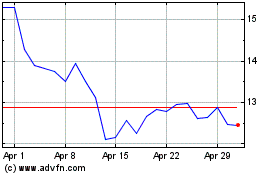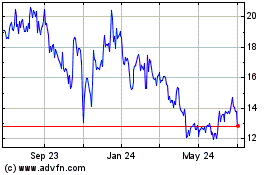By Suzanne Vranica
Consumer-goods giant Unilever PLC said it would halt U.S.
advertising on Facebook Inc. and Twitter Inc. for at least the
remainder of the year, citing hate speech and divisive content on
the platforms, a significant escalation in Madison Avenue's efforts
to force changes by the tech companies.
Within an hour of the move being announced, Facebook Chief
Executive Mark Zuckerberg announced a set of new policies designed
to combat voter suppression and better protect minorities on the
platform. He didn't mention Unilever's decision.
Unilever, whose many household brands include Dove soap,
Hellmann's mayonnaise and Lipton tea, joins a growing list of
companies that are boycotting Facebook for varying lengths of time,
including Verizon Communications Inc., Patagonia Inc., VF Corp.,
North Face, Eddie Bauer and Recreational Equipment Inc.
"Based on the current polarization and the election that we are
having in the U.S., there needs to be much more enforcement in the
area of hate speech," said Luis Di Como, Unilever's executive vice
president of global media, in an interview.
"Continuing to advertise on these platforms at this time would
not add value to people and society," the company said. Its
Facebook ban also will cover Instagram.
The Facebook advertising boycott came after civil-rights groups
including the Anti-Defamation League and NAACP called on brands to
pull ad spending from Facebook for July. The groups said the
social-media giant hadn't made enough progress enforcing its
policies on hate speech and misinformation.
Among the new policies Mr. Zuckerberg announced on Friday, the
company will begin labeling posts that violate its policies but are
deemed newsworthy -- giving Facebook the option of labeling
President Trump's posts, as Twitter has done recently. Facebook
will also put in additional safeguards to prevent voter suppression
and shield immigrants from ads that depict them as inferior.
Mr. Zuckerberg said he would continue working with civil-rights
groups and others to set effective policies as the election
approaches.
"I'm optimistic that we can make progress on public health and
racial justice while maintaining our democratic traditions around
free expression and voting," he said.
After Mr. Zuckerberg's live-stream in which he announced the new
policies, Rashad Robinson, president of the civil-rights group
Color of Change tweeted that the remarks were "11 minutes of wasted
opportunity to commit to change."
Twitter wasn't a target of the civil-rights group's boycott
call, but it has also come under scrutiny on Madison Avenue.
In a statement to The Wall Street Journal, Facebook said it
invests billions of dollars every year to keep its platform safe
and has banned 250 white-supremacist organizations from Facebook
and Instagram. It said artificial intelligence helps it find nearly
90% of hate speech before anyone flagged it. "We know we have more
work to do," the company said, adding that it would continue to
work with Global Alliance for Responsible Media -- an ad-industry
group created to improve the digital ecosystem, and of which
Unilever is a founding member -- as well as other experts "to
develop even more tools, technology and policies to continue this
fight."
"We have developed policies and platform capabilities designed
to protect and serve the public conversation, and as always, are
committed to amplifying voices from underrepresented communities
and marginalized groups," said Sarah Personette, Twitter's vice
president of Global Client Solutions, in a statement. "We are
respectful of our partners' decisions and will continue to work and
communicate closely with them during this time."
Facebook has taken some steps in recent years to better police
its platforms, adding workers and developing new technology. That
has resulted in the removal of hate speech and other objectionable
content.
"We acknowledge the efforts of our partners, but there is much
more to be done, especially in the areas of divisiveness and hate
speech during this polarized election period in the U.S.," Unilever
said. "The complexities of the current cultural landscape have
placed a renewed responsibility on brands to learn, respond and act
to drive a trusted and safe digital ecosystem."
Mr. Di Como said Unilever would like to see a reduction in the
level of hate speech on the platforms and wants independent
companies to measure and confirm that progress has been made.
Unilever, which is one of the biggest ad spenders in the world,
said it would shift its U.S. ad dollars that have been earmarked
for Facebook and Twitter to other media. Unilever spent $42.3
million on Facebook ads in the U.S. last year, research company
Pathmatics Inc. estimates. Unilever declined to comment on its ad
spending.
The big tech platforms have been under increasing pressure --
from politicians, outside groups, and their own users -- to crack
down harder on misinformation and hate speech. Facebook, in
particular, has become a target because of its position that
political speech, including comments by President Donald Trump,
generally shouldn't be fact-checked and removed.
Tensions have been heightened since the widespread U.S. protests
spurred by the killing of George Floyd, and the resulting national
dialogue about race and police brutality. But many concerns about
the platforms have been festering for years. The Anti-Defamation
League, for example, has long pushed Facebook to view Holocaust
denial as a form of hate speech.
Corporate advertisers, whose ad spending is the financial
foundation for tech giants, have applied pressure as well --
sometimes quietly, behind the scenes, sometimes in public. The
latest boycott represents a substantial escalation, especially with
the addition of bigger players like Unilever and Verizon. Verizon
said it was pausing its advertising until Facebook can create a
solution that makes the company comfortable.
Motives for joining such boycotts can be all over the map. Some
companies see a chance to get positive attention for taking a stand
on a social matter. Others are worried about their brand's
association with controversial content -- and, if history is a
guide, they may return to advertising when the dust settles. Some
see an opportunity to strike a blow at the powerful digital
platforms.
And for others, ad boycotts are a moral fight that is worth
having even if it hurts their business.
For many companies, pulling ads off Facebook is a difficult
proposition, because it is such an efficient marketing vehicle and
has so much data on consumers to help target ads. Unilever said it
isn't removing Facebook and Twitter ads in non-U.S. markets because
the divisive content is currently more pronounced in the U.S.
Unilever has been a leader in demanding that tech giants clean
up the digital ad ecosystem. It has pushed them to police
advertising fraud and has been outspoken about the lack of
transparency in Facebook's and Google's metrics that show whether
advertising is working.
Unilever also has taken stances on social issues: This week, it
said it would discontinue the name "Fair & Lovely" for its
international skin-lightening cream, acknowledging it reinforces
the racist notion that light skin is better. The product will still
be sold. The company has also been working to eliminate
stereotypical portrayals of women in its advertising.
Procter & Gamble Co., another consumer products giant that
is highly influential on Madison Avenue, said it is reviewing all
platforms on which it advertises for objectionable content.
Facebook is included in that review, according to a person familiar
with the matter. The company's marketing chief, Marc Pritchard, on
Wednesday vowed that the company wouldn't advertise "on or near
content that we determine is hateful, denigrating or
discriminatory."
Deepa Seetharaman contributed to this article.
Write to Suzanne Vranica at suzanne.vranica@wsj.com
(END) Dow Jones Newswires
June 26, 2020 15:50 ET (19:50 GMT)
Copyright (c) 2020 Dow Jones & Company, Inc.
VF (NYSE:VFC)
Historical Stock Chart
From Jun 2024 to Jul 2024

VF (NYSE:VFC)
Historical Stock Chart
From Jul 2023 to Jul 2024
